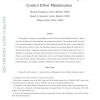Free Online Productivity Tools
i2Speak
i2Symbol
i2OCR
iTex2Img
iWeb2Print
iWeb2Shot
i2Type
iPdf2Split
iPdf2Merge
i2Bopomofo
i2Arabic
i2Style
i2Image
i2PDF
iLatex2Rtf
Sci2ools
TAC
2016
2016
Maximum Hands-Off Control: A Paradigm of Control Effort Minimization
In this paper, we propose a new paradigm of control, called a maximum hands-off control. A handsoff control is defined as a control that has a short support per unit time. The maximum hands-off control is the minimum support (or sparsest) per unit time among all controls that achieve control objectives. For finite horizon control, we show the equivalence between the maximum hands-off control and L1 optimal control under a uniqueness assumption called normality. This result rationalizes the use of L1 optimality in computing a maximum hands-off control. We also propose an L1 /L2 -optimal control to obtain a smooth hands-off control. Furthermore, we give a self-triggered feedback control algorithm for linear time-invariant systems, which achieves a given sparsity rate and practical stability in the case of plant disturbances. An example is included to illustrate the effectiveness of the proposed control.
TAC 2016 |
Related Content
| Added | 10 Apr 2016 |
| Updated | 10 Apr 2016 |
| Type | Journal |
| Year | 2016 |
| Where | TAC |
| Authors | Masaaki Nagahara, Daniel E. Quevedo, Dragan Nesic |
Comments (0)

